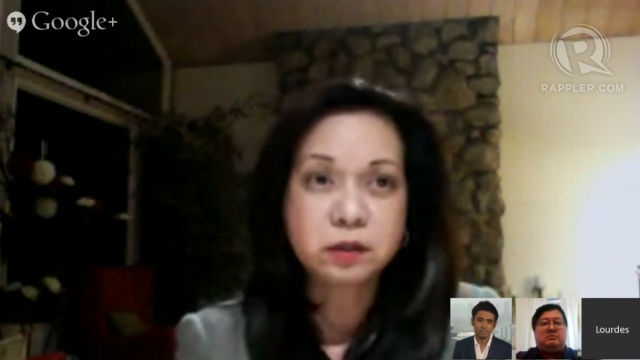SUMMARY
This is AI generated summarization, which may have errors. For context, always refer to the full article.

MANILA, Philippines – Filipino Americans were among the ethnic voting groups who supported Barack Obama when he first ran for president and won in 2008, and when he was re-elected in 2012.
Of the more than 3 million Filipinos and Filipino Americans living in the United States, between 700,000 and one million are eligible to vote. An exit poll by the New York-based Asian American Legal Defense Fund (AALDEF) showed that 65% of registered Fil-Am voters chose Obama in 2012.
As Obama enters the last two years of his second term, how do Filipino Americans rate him? C+, or an average grade, according to veteran journalist Rene Pastor and immigration lawyer Lourdes Tancinco, who joined Rappler in a special Hangout on #BalikBayan on April 28, when Obama made his first official state visit to Manila. (READ: Obama visits Manila Day 1 and Day 2)
Why a C+? “I suppose the main thing is that immigration reform is still stuck in Congress, but not entirely his fault,” Pastor told Rappler.
Despite immigration reform passing in the US senate in 2013 with overwhelming bipartisan support, it has yet to reach Obama’s desk because of party disagreements on the principles of the immigration overhaul. The Senate bill would give qualified undocumented immigrants a path to citizenship and reform employment and family-based petitions for visas, among other reforms.
“The number of deportations are at a record high, so that’s a bit of a negative as far as the immigration community is concerned,” said Pastor. (READ: Waiting for a sign: Obama, Pinoys and immigration reform)
Some say there have been 2 million to 3 million deportations under President Obama, but it is a figure that remains disputed among political analysts and the media.
Tancinco said: “Right now, I would give Obama a C+. The reason is that a lot of the sentiment of the Filipino community is on two issues: one, of course, is the veterans issue, second is immigration reform.”
She added: “It’s very frustrating if you ask a Filipino right now and they say, oh immigration reforms? They say forget about it, we’ve been waiting for a long time for immigration reform, nothing is going to happen.”
Party politics
Despite calls for compromise it doesn’t seem like either side is willing to budge on their stance on immigration.
“Number one is, I think, they (Republicans) have committed not to pass immigration reform at all. That’s what I’m hearing, although of course there are some Republicans who are, but a majority of them are not,” Tancinco added. “If we have more Democrats in Congress, most probably reform would have been acted on when the Senate bill was passed last year.”
Conservative lawmakers published their guiding principles on immigration reform last year and reiterated that those who entered the United States illegally should not, under any circumstances, be allowed citizenship.
“That’s like creating second-class citizens, or second-class people,” Pastor said. “It’s like involuntary servitude in that sense. I mean, these guys will be contributing to taxes,” he added.
Tancinco shared that she believes the issue is fairness.”If you deprive an immigrant a path to citizenship, it’s just like creating segregation…. I don’t think it’s fair after they have contributed and then you limit their benefits by depriving them of citizenship.”
Slow justice for WWII vets
Another issue Fil-Am leaders hound the Obama administration about is veterans equity. “It is true that there is Filipino veterans equity compensation back in 2009 when President Obama was first elected. He gave $15,000 to Filipino veterans who have US citizenship and $9,000 to those with Philippine citizenship, but believe it or not that has not been implemented equally,” Tancinco noted. (READ: America’s second-class veterans)
It took decades after the Recission Act of 1946, the bill that stripped Filipino veterans of full benefits, for Filipino veterans to get compensation and were still having problems trying to obtain their funds. (READ: Obama laments ‘injustice’ to PH war veterans)
A provision in the Senate immigration reform bill (S 744), was passed to benefit the veterans. “Petitions for children of World War II veterans will be exempted from numerical limitations,” Tancinco highlighted. “Meaning to say, they will not wait for their priority dates to be current. They will be processed for their visas despite the fact that this Filipino veteran may have passed away already.”
Who should get TPS?
After Typhoon Yolanda struck the eastern and central Visayas, Filipino groups in the United States began clamoring for the US to grant temporary protected status (TPS) to an estimated 200,000 Filipinos whose visas are out of status. (READ: Pinoys in NY push for Temporary Protected Status)
TPS would be granted if conditions temporarily prevent its nationals who are living in the US from returning safely.
“Initially, I believe TPS is actually deserving of the Filipinos who are actually from the region,” Tancico specified. Tancinco provided a differing view on the clamor by several Filipino groups in the US and in the Philippines to grant TPS. She said, “My belief is that the answer to undocumented Filipino workers is immigration reform, TPS is for those who are affected by the calamity.”
Filipino Americans are not optimistic that the changes that matter to them will happen; at least not anytime soon. (READ: 5 US policies that Filipino Americans support) – Rappler.com
Add a comment
How does this make you feel?
There are no comments yet. Add your comment to start the conversation.